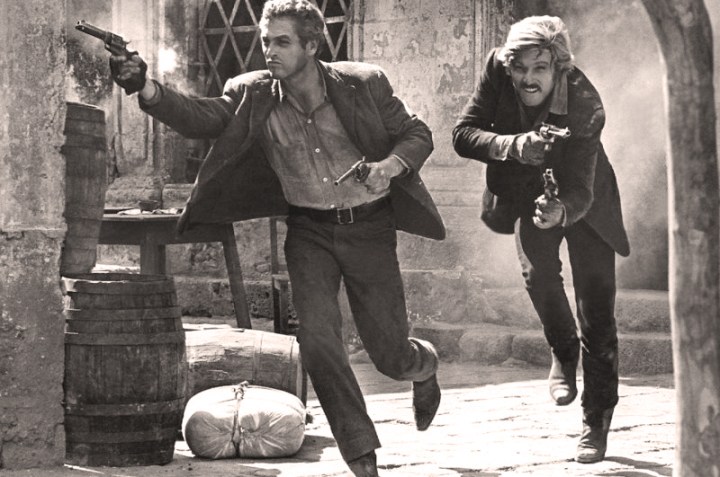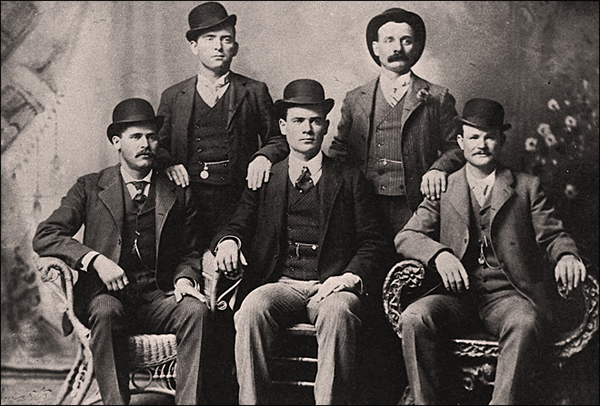Sci-Tech
Raindrops kept falling on Butch Cassidy’s head – long after Bolivian shootout, claims new evidence

Americans have a love affair with their most famous bandits and outlaws. Novels, comic books, films and television shows all attest to this as stories about real bad guys like Billy the Kid, Bonnie and Clyde, Al Capone and Bugsy Siegel continue to nourish popular culture. And that doesn’t even begin to take into account the tales about fictional ones like Little Caesar. By J BROOKS SPECTOR.
Probably no American anti-heroes have ever gotten quite the star treatment of Butch Cassidy and the Sundance Kid – right back to when The New York Times reported their daring Union Pacific train robbery on 2 June 1899. Of course, it hasn’t hurt the legend that they were portrayed by Paul Newman and Robert Redford – with beautiful Katherine Ross as Cassidy’s gun moll, Etta Place. Or that Hal David/Burt Bacharach music, sung by BJ Thomas, softened the edges of their tale.
For years, the official story (and the Hollywood one as well) has been that the two died facing off against the entire Bolivian army. For Hollywood at least, they went in a blaze of glory and slow-mo cinematography. Now, however, comes a report that Bolivia wasn’t the end after all. Instead, Butch Cassidy returned to the US after the Bolivian heroics and lived on in the west as a mind-mannered, law-abiding machinist and retiree for nearly three decades more.
This new story comes from a rare book collector who says he has a 1934 manuscript entitled “Bandit Invincible: The Story of Butch Cassidy”. Some 200 pages long, and twice the length of a long-known novella with the same title, it was written by William Phillips who died in Spokane, Washington in 1937.
According to book collector Brent Ashworth and Montana writer Larry Pointer, this manuscript offers the best evidence to date – including details on Cassidy that only the man himself could have known about – that “Bandit Invincible” was actually the famous criminal’s autobiography and that Phillips was Butch Cassidy himself.
Of course, not everybody has been immediately and completely won over. It’s “total horse pucky,” says Cassidy historian Dan Buck. “It doesn’t bear a great deal of relationship to Butch Cassidy’s real life, or Butch Cassidy’s life as we know it.”

Wild Bunch: Sitting (l to r): Harry A. Longabaugh, alias the Sundance Kid, Ben Kilpatrick, alias the Tall Texan, Robert Leroy Parker, alias Butch Cassidy; Standing (l to r): Will Carver, alias News Carver and Harvey Logan, alias Kid Curry; Fort Worth, Texas, 1900.Via Wikipedia
Old West historians generally agree Cassidy was born Robert LeRoy Parker in 1866 in Beaver, Utah. His first bank robbery was in 1889 and then he fell in with some cattle rustlers hiding out in the “Hole in the Wall”, a hideaway in northern Wyoming. Cassidy managed to get away before the ranchers did away with cattle rustling (and the rustlers) in the so-called “Johnson County War.” These events are the setting for many books and films, including “Shane”, “Heaven’s Gate” and “The Virginian”, just to name a few.
Learning his chosen craft, Parker, now Butch Cassidy, had served a three-year prison sentence for possession of some stolen horses. Afterwards, he went onto his attention-grabbing spree of train and bank robberies all across the west – and then on to South America.
Ashworth says the author of “Bandit Invincible” clearly changed some of the names and incidents, but the manuscript has corroborative details that could only have come from the man himself. These include a judge’s meeting with Cassidy while he was in prison in 1895, in which the judge offered to “let bygones be bygones” and offered to get a pardon from the governor for Cassidy. According to the material, Cassidy refused to shake the judge’s hand, saying, “I must tell you now that I will even my account with you, if it is the last act I ever do.” And, in fact, Wyoming’s state archive has an 1895 letter by the very judge who had put Cassidy into prison. In his letter, the judge describes how Cassidy harboured some “ill-will” about the thing and refused the “friendly advances” of another judge, Jay Torrey, who actually visited Cassidy in prison. Torrey and Cassidy had previously had words in court two years before when Cassidy sued the judge for stealing his cattle.
In explaining why these small details are crucial, Pointer says, “What’s really remarkable to me is that, who else cares? Who else would have remembered it in that kind of detail… about an offer of a handshake and refusing it in a prison in Wyoming in 1895?”
“Bandit Invincible” also describes how another rustler, Ed Seeley, told Cassidy’s gang how to find their remote hideout in northern Wyoming. Pointer adds Cassidy’s gang hid there more than at Hole in the Wall, a spot that was by then known to authorities. And, in fact, records do show an Edward Seeley was imprisoned at the Wyoming Territorial Prison while Cassidy was there. Pointer adds “That’s just really exciting to me because this is really ephemeral stuff. No one who had not been there or done that would know that.” Doubters argue that of course Phillips would have known some of these things – he and Cassidy had known each other years before.
Watch:
Now most people believe Cassidy and Sundance died in Bolivia in 1908, just like the film says, but there have been rumours, reports and tales for years of people meeting up with one or both of the robbers in Patagonia, or in the Andes, or New York City, or all over the western US.
True to its genre, cornered by Bolivian soldiers, the two men make their stand. Sundance is killed, but Butch escapes to Europe, has plastic surgery in Paris and returns to the US to meet up with his old flame in the high country of Wyoming. Naturally.
Phillips’ later life, however, was a little less flamboyant than that of the outlaw. Late in life, he told friends he was the famous outlaw, and he wandered around Wyoming in the 1930s, trying to find the buried loot from Cassidy’s robberies. In 1938, after her husband died, his widow, Gertrude Phillips, told historians she and her husband had known Cassidy but that Phillips wasn’t the outlaw. Pointer says Phillips’ stepson says she only did that to escape the notoriety.
Unfortunately, DNA testing won’t be much help as Phillips was cremated, just like Cassidy was. However, the story has made at least one convert. The director of the Fremont County Pioneer Museum, Carol Thiesse, says “If Phillips wasn’t [Cassidy], he certainly knew a heck of a lot about Butch.”
Regardless of the truth, it’s almost guaranteed to become a new History Channel documentary – but probably not a Hollywood blockbuster. Newman’s no longer with us (who else could play Butch Cassidy?) and it’s hard to visualise a hit film about a guy who survives a hail of Bolivian bullets only to become a mild-mannered machinist, living in Spokane, Washington until he dies peacefully of old age.
That’s the thing about those legendary criminals – if they die peaceably in their old age, it’s not worth buying a ticket to watch. Little Caesar retired in Florida? Al Capone doddering along in his rural estate along the Hudson? Bonnie and Clyde growing fat and lazy on a beach on the Gulf of Mexico sea coast? Nah. DM
For more, read:
- Did Butch Cassidy Survive 1980 Shootout? In CBS News Website;
- Old Text, New Wrinkles: Did Butch Cassidy Survive? In the New York Times;
- BUTCH CASSIDY – the original movie review – in the New York Times;
- Investigating History: Butch Cassidy and the Sundance Kid (2004) review of a documentary in the New York Times;
- ANTIQUES; Treasuring Ancient Secrets Of Patagonia (rumours of Cassidy in South America) in the New York Times.




 Become an Insider
Become an Insider